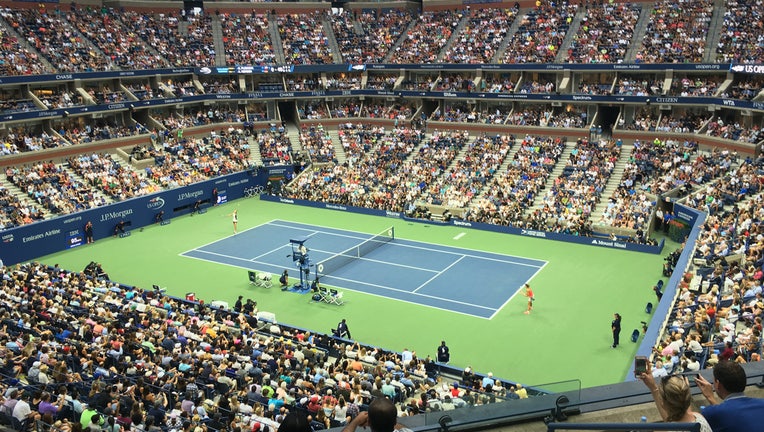U.S. Open to be held without fans if government gives OK

Karolina Pliskova of the Czech Republic serves to Angelique Kerber of Germany in the women's singles final of the U.S. Open at Arthur Ashe Stadium in Flushing Meadows, N.Y., September 10, 2016. (FOX 5 NY / Arun Kristian Das)
The U.S. Tennis Association intends to hold the U.S. Open in New York starting in August without spectators, if it gets governmental support — and a formal announcement could come this week.
Like many sports, the professional tennis tours have been suspended since March because of the coronavirus pandemic. The French Open was postponed from May to September and Wimbledon canceled altogether for the first time in 75 years. The U.S. Open, if played, would be the second Grand Slam tournament of the year, following the Australian Open in January.
"We're ready to move forward as long as we get all the approvals we need," USTA spokesman Chris Widmaier said in a telephone interview Monday.
"At the end of the day, there are three factors involved in the decision-making. No. 1 is creating a plan that has health and safety at the forefront. No. 2 is whether conducting the U.S. Open is the right thing for the sport of tennis. And No. 3 is whether it can be done in a financially viable manner. We believe we can hit all three of the objectives," Widmaier said. "But we do need to approach this in a step-by-step manner, and when all of the steps are completed, that is when we can make an official announcement."
The operational plan to hold the event amid concerns about the coronavirus includes no spectators, limited player entourages, centralized housing, increased cleaning at the tournament grounds in Flushing Meadows and testing for COVID-19.
Also part of the plan: There would be no qualifying for singles. Players whose rankings would have put them in that field will get money that the USTA will pass along to the ATP and WTA tours to distribute. The Cincinnati tournament scheduled for Aug. 16-23, which is majority-owned by the USTA, will be moved to New York in place of U.S. Open qualifying.
"We have submitted our proposal to the state of New York. It's a very comprehensive plan that details all operational aspects of the tournament — first and foremost, the health and safety of anyone involved in the tournament," Widmaier said. "We are waiting to hear back from state officials on the viability of that plan. The U.S. Open is one of many professional sports entities within the state of New York and we recognize that the state needs to review all sports in a comprehensive manner."
One big question that remains, if the state gives the go-ahead: Which players would participate?
Such top names as both No. 1-ranked players, Novak Djokovic and Ash Barty, have expressed reservations about heading to New York. So has defending men's champion Rafael Nadal. Already ruled out: Roger Federer, who has won five of his men's-record 20 Grand Slam singles titles at the U.S. Open but announced recently that he is out for the rest of the year after needing a second arthroscopic surgery on his right knee.
Last week, Djokovic said the restrictions that would be in place for the U.S. Open in New York because of COVID-19 would be "extreme."
"Most of the players I have talked to were quite negative on whether they would go there," Djokovic said.
All sanctioned tournaments have been scrapped until at least late July.
"I have concerns, too," Barty wrote in an email to the AP. "I understand the tournaments are eager to run, but keeping everyone safe has to be the priority."
The USTA wants to add locker rooms — including at indoor courts that housed hundreds of temporary hospital beds at the height of New York's coronavirus outbreak — and improve air filtration in existing spaces. Also being considered: no locker-room access until just before a match. So if anyone goes to Flushing Meadows just to train, tournament director Stacey Allaster said in an interview last month, "You come, you practice, and return to the hotel."
Widmaier said the USTA has been consulting with the ATP and WTA about its setup.
"Our stated goal has been that, if we could build a plan in conjunction with medical and security experts that mitigated the risks of COVID-19 and assured the health and well-being of all U.S. Open participants, we very much want to move ahead with the tournament," he said. "We believe, by working in the collaborative manner with these experts and the two tours, we have such a plan."

